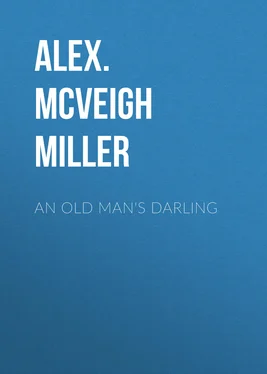Alex. McVeigh Miller - An Old Man's Darling
Здесь есть возможность читать онлайн «Alex. McVeigh Miller - An Old Man's Darling» — ознакомительный отрывок электронной книги совершенно бесплатно, а после прочтения отрывка купить полную версию. В некоторых случаях можно слушать аудио, скачать через торрент в формате fb2 и присутствует краткое содержание. Издательство: Иностранный паблик, Жанр: foreign_prose, foreign_antique, на английском языке. Описание произведения, (предисловие) а так же отзывы посетителей доступны на портале библиотеки ЛибКат.
- Название:An Old Man's Darling
- Автор:
- Издательство:Иностранный паблик
- Жанр:
- Год:неизвестен
- ISBN:нет данных
- Рейтинг книги:5 / 5. Голосов: 1
-
Избранное:Добавить в избранное
- Отзывы:
-
Ваша оценка:
- 100
- 1
- 2
- 3
- 4
- 5
An Old Man's Darling: краткое содержание, описание и аннотация
Предлагаем к чтению аннотацию, описание, краткое содержание или предисловие (зависит от того, что написал сам автор книги «An Old Man's Darling»). Если вы не нашли необходимую информацию о книге — напишите в комментариях, мы постараемся отыскать её.
An Old Man's Darling — читать онлайн ознакомительный отрывок
Ниже представлен текст книги, разбитый по страницам. Система сохранения места последней прочитанной страницы, позволяет с удобством читать онлайн бесплатно книгу «An Old Man's Darling», без необходимости каждый раз заново искать на чём Вы остановились. Поставьте закладку, и сможете в любой момент перейти на страницу, на которой закончили чтение.
Интервал:
Закладка:
"My uncle died without a will!" repeated Bonnibel in surprise.
"Yes," Mrs. Arnold answered, coolly.
"Oh, but, aunt, you must be mistaken," said Bonnibel, quickly, while a slight flush of excitement tinted her pale cheeks. "Uncle Francis did leave a will. I am sure of it."
"Then where is it?" inquired Mrs. Arnold.
"In his desk in the library," said the girl confidently. "He told me but a few hours before his death that he had made his will, and provided liberally for me, and he said it was at that minute lying in his desk."
"Are you sure you have quite recovered from the delirium of your fever?" inquired the widow, scornfully. "This must be one of the vagaries of illness."
"I am as sane as you are, madam," said Bonnibel, indignantly.
"Perhaps," sneered Mrs. Arnold, rustling uneasily in the folds of her heavy black crape. "However that may be, no will has been found, either in the desk or in the hands of his lawyer, where it should most probably be. The lawyer admits drawing one up for him years ago, but thinks he must have destroyed it later, as no trace of it can be found."
"I have nothing to live upon, then," said Bonnibel, vaguely.
She did not comprehend the extent of the calamity that had fallen upon her. Her sorrow was too fresh for her mind to dwell upon the possibilities of the future that lay darkly before her.
"You have absolutely nothing," repeated Mrs. Arnold, grimly. "Your father left you nothing but fame ; your uncle left you nothing but love . You will find it difficult to live upon either."
Bonnibel stared at her blankly.
"You are utterly penniless," Mrs. Arnold repeated, coarsely.
"Then what am I to do?" asked the girl, gravely, twisting her little white hands uneasily together.
"What do you suppose?" the lady inquired, with a significant glance.
A scarlet banner fluttered into the white cheeks of the lovely invalid. The tone and glance of the coarse woman wounded her pride deeply.
"You will want me to go away from here, I suppose," she answered, quietly.
Mrs. Arnold straightened herself in her chair, and to Bonnibel's surprise assumed an air of wounded feeling.
"There, now, Bonnibel," said she, in a tone of reproach, "that is just like you. I never expected that you, spoiled child as you are, would ever do me justice; but do you think I could be so unfeeling as to cast you, a poor orphan child, out upon the cold charity of the world?"
Bonnibel's guileless little heart was deceived by this dramatic exhibition of fine feeling. She began to think she had done her uncle's wife injustice.
"Forgive me, aunt," she answered, gently. "I did not know what your feelings would be upon the subject. I know my uncle intended to provide for me."
"But since he signally failed to do so I will see that you do not suffer," said the widow, loftily; "of course, I am not legally compelled to do so, but I will keep you with me and care for you the same as I do for my own daughter, until you marry, which, I trust, will not be long after you lay aside your mourning. A girl as pretty as you, even without fortune, ought to make an early and advantageous settlement in life."
The whiteness of the girl's fair, childish face was again suffused with deep crimson.
"I shall never marry," she answered, sadly, thinking of the lover-husband who had left her months ago, and from whose silence she felt that he must be dead; "never, never!"
"Pshaw!" said Mrs. Arnold, impatiently; "all the girls talk that way, but they marry all the same. I should be sorry to have to take care of you all your life. I expect you and Felise to marry when a suitable parti presents himself. My daughter already has an admirer in New York whom she would do well to accept. He is very old, but then he is a millionaire."
She arose, stately, handsome and dignified.
"Felise and I return to New York Saturday," she said. "Will you be strong enough to accompany us?"
"I am afraid not," said Bonnibel, faintly.
"Very well. Your maid and the housekeeper will take care of you in our absence. I will send you a traveling suit of mourning, and when you feel strong enough you can come to us."
"Yes, madam," Bonnibel answered, and the wealthy widow left the room.
So in a few weeks after, while nature was putting off her gay livery and donning winter hues, Bonnibel laid aside the bright garments she had been wont to wear, as she had already laid aside the joy and gladness of her brief spring of youth, and donning the black robes of bereavement and bitterness,
"Took up the cross of her life again,
Saying only it might have been."
The day before she left Sea View she went down to the shore to have a parting row in her pretty little namesake, the Bonnibel .
She had delayed her return to the city as long as possible, but now she was growing stronger she felt that she had no further excuse to dally in the home she loved so well, and which was so inseparably connected with the two beloved ones so sadly lost—the uncle who had gone away from her through the gates of death, and the young husband who seemed separated from her just as fatally by time and distance.
As she walked slowly down to the shore in the beautiful autumnal sunshine it seemed to her they both were dead. No message came to her from that far Italy, which was the beloved Mecca of Leslie's hopes and aspirations. He had never reached there, she told herself. Perhaps shipwreck and disaster had befallen him on the way.
No thought of his forgetfulness or falsity crossed the mind of the loyal little bride. It seemed to her that death was the only thing that could have thrown that strange gulf of silence between their hearts.
She sprang into the little skiff—one of her uncle's loving gifts to his niece—and suffered it to drift out into the blue waves. A fresh breeze was blowing and the water was rather rough. The breeze blew the soft, short rings of gold merrily about her white temples where the blue veins were seen wandering beneath the transparent skin.
The last time she had been out rowing her hair had flouted like a banner of gold on the breeze, and her cheek had glowed crimson as the sunny side of a peach.
Now the shorn locks and the marble pallor of her cheeks told a different story. Love and beauty had both left her, she thought, mournfully. Yet nature was as lovely as ever, the blue sky was mirrored as radiantly in the blue sea, the sunshine still shone brightly, the breeze still whispered as tenderly to its sweethearts, the flowers. She alone was sad.
She stayed out a long while. It was so sunny and warm it seemed like a summer instead of an autumn day. The sea-gulls sported joyously above the surface of the water, now and then a silvery fish leaped up in the sunshine, its scales shining in beautiful rainbow hues, and shedding the crystal drops of spray from its body like a shower of diamonds, and the curlew's call echoed over the sea. How she had loved these things in the gay and careless girlhood that began to seem so far away in the past.
"That was Bonnibel Vere," she said to herself, "the girl that never knew a sorrow. I am Bonnibel Dane, whose life must lie forever in the shadow!"
She turned her course homeward, and as she stepped upon the shore she picked out a little blue sea-flower that grew in a crevice of the rock, and stood still a moment looking out over the blue expanse of ocean, and repeating some pretty lines she had always loved:
"'Tis sweet to sit midst a merry throng
In the woods, and hear the wild-bird's song;
But sweeter far is the ceaseless dirge,
The music low of the moaning surge;
It frets and foams on the shell-strewn shore,
Forever and ever, and evermore.
I crave no flower from the wood or field,
No rare exotic that hot-beds yield;
Give me the weeds that wildly cling,
On the barren rocks their shelter fling;
Those are the flowers beloved by me—
They grow in the depths of the deep blue sea!"
Интервал:
Закладка:
Похожие книги на «An Old Man's Darling»
Представляем Вашему вниманию похожие книги на «An Old Man's Darling» списком для выбора. Мы отобрали схожую по названию и смыслу литературу в надежде предоставить читателям больше вариантов отыскать новые, интересные, ещё непрочитанные произведения.
Обсуждение, отзывы о книге «An Old Man's Darling» и просто собственные мнения читателей. Оставьте ваши комментарии, напишите, что Вы думаете о произведении, его смысле или главных героях. Укажите что конкретно понравилось, а что нет, и почему Вы так считаете.












